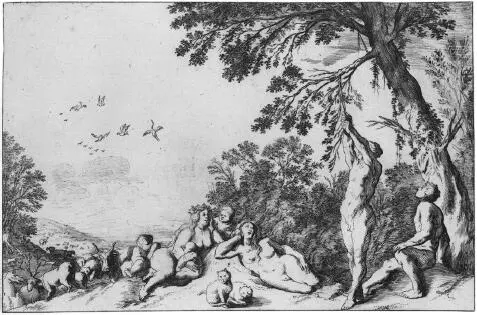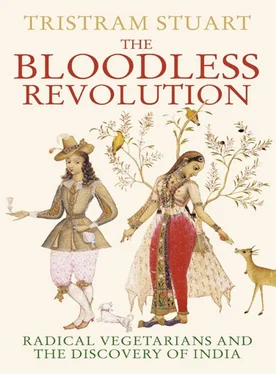Bacon too was aware of how suspicious his predilection for vegetables could seem. Regardless of being called a Catholic, Bacon was afraid he would be accused of sympathising with the medieval vegetarian heretics, the Manicheans and Cathars, whom the Inquisition had genocidally suppressed with fire and sword. Anxious to avoid such a fate, Bacon issued repeated disclaimers: ‘Neither would we be thought to favour the Manichees , or their diet, though wee commend the frequent use of all kindes of seedes, and kernels, and roots … neither let any Man reckon us amongst those Hereticks , which were called Cathari. ’ Bacon was trying to shift discussions of diet away from its old heretical connotations into the new idiom of enlightened philosophy. His opinions, he insisted, were based on empirical facts and not on religious dietary taboos. 8
Happily, Bacon’s healthy vegetable diet appears to have done Bushell a world of good. By the time he was buried in the cloisters of Westminster Abbey in 1674 at the fine old age of eighty, Bushell had become a legendary figure, and is still remembered today as the Calf of Man’s most famous inhabitant. For a while, he was also rich. Having come down from his cliff, he pursued Bacon’s practical tip on reclaiming silver and lead mines in Wales and established his own mint in Aberystwyth. God was so pleased with his vegetarian penitence, he claimed, that He gave Bushell power to subdue the ‘Subteranean Spirits’ which usually hindered mining projects. With the profits that flowed from the earth, he proclaimed his intention to realise Bacon’s plans for a ‘Solomon’s House’ – the utopian establishment depicted in Bacon’s unfinished work, New Atlantis. Bacon had imagined an ideal colony where scientific endeavour (including a primitive form of genetic engineering) was enhanced by the inhabitants’ rigorous lifestyle, some of them purifying their bodies by living in three-mile-deep caves below the mountains. Bushell’s institution was not quite what Bacon had imagined. It was more like a philanthropic dining facility for his miners, where instead of being fed the complete meal Bacon had devised – a fermented-meat drink – they were fed on Bushell’s own meagre diet of penitential bread and water.
Bushell himself retreated, meanwhile, to his estate at Road Enstone, near Woodstock in Oxfordshire, where he created a ‘kind of paradise’ in a grotto garden around a cave which became famous for a natural spring generating a series of spectacular hydraulic contraptions. He was no doubt inspired by Bacon’s cave-dwelling multi-centenarian wise men and by the ‘paradise’ garden at Bacon’s mansion in Gorhambury where the pair used to spend hours in meditation. In his new abode Bushell kept up his old dietary resolve, writing that he still ‘observ’d my Lords prescription, to satisifie nature with a Diet of Oyle, Honey, Mustard, Herbs and Bisket’. King Charles I and Queen Henrietta visited Bushell in his grotto in 1636, and for their pleasure he organised the performance of a masque about a vegetarian prodigal hermit. The Queen expressed her appreciation by installing an extremely rare Egyptian mummy in Bushell’s damp grotto home (where it slowly went mouldy and was lost to posterity).
When civil war broke out in 1642, Bushell roused himself from his tranquil retreat. As political affiliations polarised those who questioned and those who believed subjects had no right to question, Bushell remained fervently loyal to King Charles. Bacon had foreseen the political turmoil and spent his career defending the royal prerogative; faithful to Bacon as always, Bushell became a mainstay of the Cavaliers’ military campaign against the Roundheads. He turned his miners into the King’s lifeguard, bankrolled the Royalist army with silver and a hundred tons of lead-shot from his mines, put down a mutiny in Shropshire, and defended (yet another island) Lundy in the Bristol Channel. Eventually surrendering to the onslaught of the Parliamentary army, he was arrested and seriously wounded in the head, but then attained the protection of Lord Fairfax. With many of his loans unsettled other than by a quaint but otherwise worthless thank-you letter from King Charles, Bushell went back to his garden, as Horace to his Sabine Farm and the poet Andrew Marvell to Nun Appleton, rejecting the anarchy of Cromwell’s interregnum in preference for his own private Eden. 9
Bushell’s dietary strictures followed an ancient Christian tradition which conceived of vegetarianism as a back door to regaining paradisal perfection. Like several Church fathers, the ascetic St Jerome (AD c. 347– 420) – revered for plucking a painful thorn from a lion’s paw and composing the Latin Bible in his penitential cave – associated the gluttony of flesh-eating with Adam’s intemperate eating of the forbidden fruit. If people wanted to undo the curse of the Fall, they would have to start by abstaining from flesh: ‘by fasting we can return to paradise, whence, through fullness, we have been expelled.’ ‘At the beginning of the human race we neither ate flesh, nor gave bills of divorce, nor suffered circumcision,’ said Jerome. These were concessions granted after the Flood, ‘But once Christ has come in the end of time,’ he said, ‘we are no longer allowed divorce, nor are we circumcised, nor do we eat flesh’. 10 This provided a theological rationale for relinquishing meat which lasted for centuries. As Sir John Pettus suggested in 1674, we ‘multiply Adams transgression by our continued eating of other creatures, which were not then allowed to us’. 11
This tradition had come under fire ever since the Protestants had split from the Roman Church. John Calvin (1509–64), co-founder of the Reformation, had tried to untangle such literal-minded dietary loopholes. He cast doubt over the vegetarianism of the early patriarchs by pointing out that God gave Adam and Eve animal skins to wear when he ejected them from Eden’s balmy realm, and that ever since the time of Cain and Abel people had sacrificed animals. But even if they didn’t eat the animals they sacrificed, he stressed, the important point was that God did eventually give ‘to man the free use of flesh, so that we might not eat it with a doubtful and trembling conscience’. Anyone who thought mankind should be vegetarian was being blasphemously ungrateful for God’s generosity. He had one message for such hyper-scrupulous quibblers: shut up and eat up. 12 But this was not enough to stem the longing for perfection, even in Protestant countries, and Bushell was one of many who still hoped to reclaim his lost innocence by abstaining from flesh.
In the masque he laid on for the King and Queen, Bushell depicted (and perhaps played) the part of the vegetarian hermit – clearly modelled on himself – who claims to have lived in the same Oxfordshire cave and subsisted on the same vegetable diet ever since the time of Noah. The hermit tells his audience he lives in a reconstructed Golden Age, ‘In which no injuries are meant or done’. The masque ended with the hermit inviting the King to join his world (and forget for a while the looming political crisis) by sharing in the feast of home-grown fruit. 13

The Golden Age, from Ovid’s Metamorphoses
Bushell was indulging in the common feeling that the biblical story of original harmony was analogous to the classical Greek and Roman myth of the Golden Age, when justice reigned, iron was yet to be invented and no animals were slaughtered. In 1632, just before Bushell’s masque, the travelling poet George Sandys had published his extremely influential translation and commentary on Ovid’s Metamorphoses. Sandys portrayed the Golden Age menu of wild blackberries, strawberries, acorns and ‘all sorts of fruit’ in a much more appetising light than translators hitherto, and added enthusiastically that ‘this happy estate abounding with all felicities, assuredly represented that which man injoyed in his innocency: under the raigne of Saturne, more truly of Adam.’ 14 Eating meat, he added, was ‘a priviledge granted after to Noah; because [‘hearbes and fruits’] then had lost much of their nourishing vertue’. Meat-eating, according to this reasoning, was an unfortunate consequence of the Flood. In the climactic finale of Metamorphoses , Pythagoras comes forward and delivers a lengthy diatribe against eating animals – ‘How horrible a Sin, / That entrailes bleeding entrailes should intomb! / That greedie flesh, by flesh should fat become!’ Sandys noted that Pythagoras’ vegetarianism was an attempt to reinstate the peacefulness of the Golden Age because killing animals proceeded ‘from injustice, cruelty, and corruption of manners; not knowne in that innocent age’. 15 Pythagoras’ example was an inspiration to early vegetarians like Bushell.
Читать дальше













